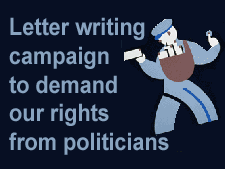Writing Letters to Elected Politicians

A great way to let your elected leaders know how you stand on an issue is to write them letters. You can also call or email, but a formal, written letter is a good way to send documented information about your beliefs. Most government and political offices timestamp and record all incoming mail, so don’t think that your letter will be added to a pile of unread mail.
I write to my congress representatives whenever action is going to be taken on something I consider important. Almost always, I get some sort of response back (usually a form letter). If you don’t know how effective your letters will be, just think about how each letter makes a difference. If an elected politician hears from enough constituents on an issue or topic, this will influence the politician’s stands on these issues.

Where to Send the Letters
There are so many different political leaders in the United States that it would take me forever to provide everyone’s accurate contact information here. I suggest you go to www.congress.org. This site is private and non-partisan, but it provides the contact information for the elected politicians in your area based on your zip code.
What to Write
Write a clear, professional letter that addresses the points you want to make. This might be difficult if you are emotionally charged about the topic you are writing on. I suggest you write down everything you are thinking and feeling. Put the letter away for a day, allowing yourself time to calm down. Then, go back to the letter and edit it. You can easily write a powerful letter without extreme statements or accusations.
You can offer some personal information about yourself to establish yourself as a constituent, and then quickly move into the reasons why you are writing. Try to stick to facts as opposed to writing based on your emotions—this will be more readily accepted and acknowledge by the political aides who will be reading your letter first.
Unless you want to end up on a special list, I suggest that you do not write crazy, ranting letters. I’ve worked in a federal government office, and I can honestly tell you that these letters are logged before being put into a “special” box.
End your letter by stating the kind of action you would like taken by your elected politician. Thank them for their time, and cordially sign the letter. Everything counts in politics, so exercise your rights to write.








